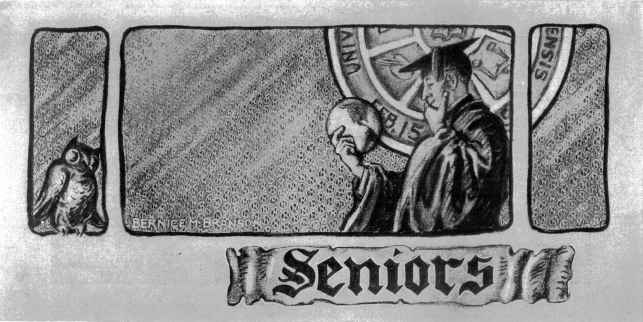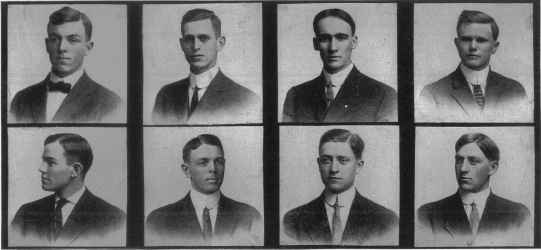
 |
|
|
|
|
|
|
|
|
|
|
|
||||||||||||
|
Having attained that position of
self-importance which comes with the distinction of being a
Sophomore, we returned full of enthusiasm and confidence.
The strength of numbers, though still apparent, was now
eclipsed by the class below, at least so we thought until
the Sophomore election took place. At this gathering, at
which three candidates appeared in the field the attendance
numbered something over two hundred and fifty, but strange
to relate the vote cast totaled between four and five
hundredthat alone is an accomplishment of which no other
class can boast. Such exuberance of spirits was, however,
not conducive to a representative election, so a special one
was held, at which Walter Power, of Ponca, was elected. Mindful of this enviable record, and
strengthened by the feeling of greater mutual interest which
comes with the junior year, we returned to look with
fatherly interest upon the struggling petty concerns of
class underclassmen. We had risen above the fights, class
caps, and even informal dances. Thereupon we made plans to
"put on" a formal party. Having chosen as leader W. L.
Bates, we left the matter of appointments in his hands, and
turned to wider interests. "Bill" did his work -- we did
ours. Those who had received the "plums" made haste to
fulfil their duties and were in the midst of the process
when the second semester came upon us. This time the honor
fell upon "Henery" Pearse, of Genoa (not Italy), who
executed his meager duties with clocklike precision, as a
president should. |
by instituting a brand new idea, at least for Nebraska -- that of a junior Week. This week (in reality only three days) to consist of Junior convocation, Junior Prom, and Junior Play. In addition to this, the entire junior class wore gold and black ribbons during the week (week here signifies seven days), a custom which has never been adhered to, before or since. Everybody took part in the Convocation. "Doc" Owens and "Pink" Holmes ran the Prom, and "Bill" Bate, and Hazel Johnson starred in the play, which had the mysterious title, "A Message from Mars." Rumor has it that several of the more tender-hearted parents who attended the performance wept at the sight of their children's faces covered with paint. Thus we had established a record which
had to be lived up to. In this, our last year, what could be
done to bring our career to a climax? Our ranks were as thin
as those of the G. A. R., our hearts, however, were, and
are, as loyal. Searching the forest for presidential honors
we hit upon "Dick" Guthrie, who carried the election with
gusto, and as usual, appointed his committees. Inasmuch as
the class had long ago lost its constitution, "Dick" was
somewhat handicapped in the matter of appointments, but
managed to confer them as satisfactorily as we could desire.
"Henery" Pearse and "Bill" Bates managed the Prom, and to
the great edification of all reported a substantial profit,
another deed of which the class can be justly proud -- not
the making of the profit, but the reporting of the same. The
Senior Masquerade was no less successful, and, owing to the
apish capers of "Rex Davies, was the "scream" of the social
calendar. |
||
 |
|||
 |
 |
 |
© 2000, 2001 T&C Miller